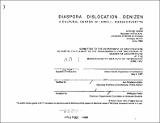Diaspora, dislocation, denizen : a cultural center in Lowell, Massachusetts
Author(s)
Hamid, Afshan
DownloadFull printable version (10.07Mb)
Alternative title
Cultural center in Lowell, Massachusetts
Advisor
Ann Pendleton-Jullian.
Terms of use
Metadata
Show full item recordAbstract
The condition of being migrant is peculiar to modernity. Being migrant is often a result of political estrangement from one's homeland, or dislocation due to economic pressures. It is a status which requires the individual to be temporary, shifting and dynamic. If the position becomes static, the migrant becomes an immigrant alien in a new and unfamiliar geographical location. Thus immigrant is the radical instability of the modern experience. Immigrant is not only a consequence of modernity, but also a metaphor for the process of modernity. Being migrant has the trauma of dislocation, of relearning communication, rethinking a cultural dialogue. It is also an interiorized alone sense of loneliness, and even a longing for a return to a familiar place and time. Being immigrant is a journey, both mental and physical. This thesis concerns itself with the issues of being an immigrant. In particular, the debate will revolve around immigrants of the last twenty years, the Asian community. I am interested in this group because they are still struggling to assimilate themselves into the American experience. The town of Lowell, Massachusetts has a community of recent immigrants from Vietnam, Cambodia and Korea. These people have been encouraged to resettle their lives due to government programs and a strong manufacturing industry in Lowell. They inhabit a part of Lowell known as Acre and the Lowlands. These areas have been home to the first Irish settlers in Lowell in the 1850s. The site for the project is itself a borderland condition, precisely where the existing Lowell community stops development and the immigrants begin their settlement. The area is currently a residential fabric on one side and an industrial locality on the opposite. The Pawtucket Canal, a man-made canal, runs through the site, acting both as a boundary and a seam.
Description
Thesis (M. Arch.)--Massachusetts Institute of Technology, Dept. of Architecture, 1997. Includes bibliographical references (p. 48-49).
Date issued
1997Department
Massachusetts Institute of Technology. Department of ArchitecturePublisher
Massachusetts Institute of Technology
Keywords
Architecture